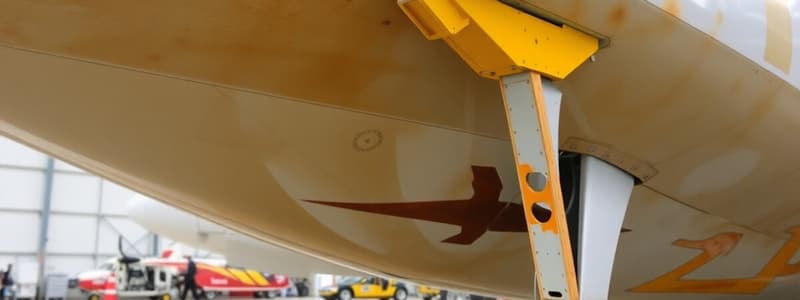Podcast
Questions and Answers
What is the purpose of rinsing the aircraft with fresh water after cleaning?
What is the purpose of rinsing the aircraft with fresh water after cleaning?
Which step is NOT recommended in the post-cleaning procedures for an aircraft?
Which step is NOT recommended in the post-cleaning procedures for an aircraft?
What type of corrosion is primarily caused by the contact of dissimilar metals?
What type of corrosion is primarily caused by the contact of dissimilar metals?
How often should aircraft operating in a severe environment be inspected for corrosion?
How often should aircraft operating in a severe environment be inspected for corrosion?
Signup and view all the answers
What is a key benefit of applying chemical surface treatments to aircraft metals?
What is a key benefit of applying chemical surface treatments to aircraft metals?
Signup and view all the answers
What should be done before performing inspections for corrosion?
What should be done before performing inspections for corrosion?
Signup and view all the answers
What is the maximum time frame between inspections for aircraft operating in a mild environment?
What is the maximum time frame between inspections for aircraft operating in a mild environment?
Signup and view all the answers
What contributes to moisture entrapment and corrosion in spot-welded skins?
What contributes to moisture entrapment and corrosion in spot-welded skins?
Signup and view all the answers
Which area is described as a common troubled zone in an aircraft where debris and fluids collect?
Which area is described as a common troubled zone in an aircraft where debris and fluids collect?
Signup and view all the answers
What type of materials do aluminum and aluminum alloys chemical conversion treatments conform to?
What type of materials do aluminum and aluminum alloys chemical conversion treatments conform to?
Signup and view all the answers
Which material should be avoided when using flux for aluminum welding due to its corrosive properties?
Which material should be avoided when using flux for aluminum welding due to its corrosive properties?
Signup and view all the answers
What is necessary for preventing corrosion in welded areas of an aircraft skin?
What is necessary for preventing corrosion in welded areas of an aircraft skin?
Signup and view all the answers
Which maintenance step is essential for controlling corrosion in control cables?
Which maintenance step is essential for controlling corrosion in control cables?
Signup and view all the answers
Which of the following is a requirement for aircraft inspection?
Which of the following is a requirement for aircraft inspection?
Signup and view all the answers
How can the corrosion risk in magnesium skin surfaces be minimized?
How can the corrosion risk in magnesium skin surfaces be minimized?
Signup and view all the answers
What potential issue arises from the joints in an aluminum alloy engine mount structure?
What potential issue arises from the joints in an aluminum alloy engine mount structure?
Signup and view all the answers
Which area is most susceptible to corrosion due to trapped exhaust trail deposits?
Which area is most susceptible to corrosion due to trapped exhaust trail deposits?
Signup and view all the answers
What contributes to corrosion in battery compartments?
What contributes to corrosion in battery compartments?
Signup and view all the answers
Which of the following areas requires frequent cleaning and lubrication to prevent corrosion?
Which of the following areas requires frequent cleaning and lubrication to prevent corrosion?
Signup and view all the answers
What is a common corrosive element found in lavatories and food services?
What is a common corrosive element found in lavatories and food services?
Signup and view all the answers
Which area of an aircraft is exposed to abrasion from high velocity air contaminants?
Which area of an aircraft is exposed to abrasion from high velocity air contaminants?
Signup and view all the answers
Which area poses a risk for corrosion due to the presence of fuel tanks?
Which area poses a risk for corrosion due to the presence of fuel tanks?
Signup and view all the answers
What should not be used on landing gear wheels to avoid additional corrosion risks?
What should not be used on landing gear wheels to avoid additional corrosion risks?
Signup and view all the answers
What type of corrosion frequently appears at seams and lap joints?
What type of corrosion frequently appears at seams and lap joints?
Signup and view all the answers
What is the primary reason operators of low utilization aircraft should base their corrosion inspection program on calendar time rather than flight hours?
What is the primary reason operators of low utilization aircraft should base their corrosion inspection program on calendar time rather than flight hours?
Signup and view all the answers
Which area should NOT be included in the daily and preflight corrosion inspection?
Which area should NOT be included in the daily and preflight corrosion inspection?
Signup and view all the answers
What should be done in an in-depth corrosion inspection regarding heavy internal preservative coatings?
What should be done in an in-depth corrosion inspection regarding heavy internal preservative coatings?
Signup and view all the answers
Why is corrosion monitoring particularly crucial in industries dealing with volatile materials?
Why is corrosion monitoring particularly crucial in industries dealing with volatile materials?
Signup and view all the answers
What is a potential consequence of failing to monitor corrosion in equipment like boilers?
What is a potential consequence of failing to monitor corrosion in equipment like boilers?
Signup and view all the answers
Which inspection method is recommended to cover areas not normally accessible in corrosion inspections?
Which inspection method is recommended to cover areas not normally accessible in corrosion inspections?
Signup and view all the answers
What environmental factors can contribute to corrosion as described?
What environmental factors can contribute to corrosion as described?
Signup and view all the answers
Which of the following is NOT a reason for corrosion monitoring mentioned?
Which of the following is NOT a reason for corrosion monitoring mentioned?
Signup and view all the answers
Which type of lubricant is recommended for use on piano hinges and electronic equipment compartments?
Which type of lubricant is recommended for use on piano hinges and electronic equipment compartments?
Signup and view all the answers
What is a key aspect of the corrosion prevention plan for aircraft?
What is a key aspect of the corrosion prevention plan for aircraft?
Signup and view all the answers
Which cleaning compound pH level is NOT recommended for use on aircraft?
Which cleaning compound pH level is NOT recommended for use on aircraft?
Signup and view all the answers
During the aircraft wash process, what is advised to avoid water intrusion?
During the aircraft wash process, what is advised to avoid water intrusion?
Signup and view all the answers
Which of the following types of inspections is NOT mentioned as part of the aircraft inspection types?
Which of the following types of inspections is NOT mentioned as part of the aircraft inspection types?
Signup and view all the answers
What substance is specifically recommended for cleaning exhaust track areas of high gloss paint systems?
What substance is specifically recommended for cleaning exhaust track areas of high gloss paint systems?
Signup and view all the answers
Which protective measure is recommended for parked aircraft during foul weather?
Which protective measure is recommended for parked aircraft during foul weather?
Signup and view all the answers
What should personnel wear while washing the aircraft?
What should personnel wear while washing the aircraft?
Signup and view all the answers
Study Notes
Common Corrosion Locations
-
Engine Exhaust Area
- Heat and exhaust gases create a potent electrolyte, increasing corrosion rate
- Cracks, seams, fairings, hinges, and fasteners are susceptible areas
- Inspection requires removal of fairings and access plates in the exhaust gas path
- Deposits trapped in gaps, seams, hinges, and fairings are difficult to clean
-
Battery Compartments & Vents
- Batteries release sulfuric acid fumes from overheated electrolyte, which corrodes structure
- Sump jars are particularly prone to corrosion
-
Lavatories & Food Services
- Organic materials like food and waste are highly corrosive to aluminum surfaces
-
Wheel Wells & Landing Gears
- Runway debris, abrasives, and chemicals damage protective coatings and lubricants
- Water and mud can freeze and cause damage
- Frequent cleaning, lubrication, and paint touch-ups are necessary
-
External Skin Area
- Seams and lap joints are vulnerable to concentration cell corrosion exposing the alloy
- Engine inlet area experiences high velocity air, removing protective coatings and causing abrasion
Inaccessible Areas
-
Fuel Tanks
- Prone to corrosion due to microscopic "bugs" in suspension within turbine fuel
- Fuel can hold these bugs until they grow and form water
-
Magnesium Skins
- Surface treatment, insulation, and painting provide corrosion resistance
- Trimming, drilling, and riveting damage the surface treatment
-
Piano-Type Hinges
- Susceptible to galvanic corrosion due to dissimilar metal contact
-
Control Surface Recesses
- Movable surfaces on wings (rudder, elevator, flaps) are vulnerable
-
Bilges
- Bottom of the fuselage and below floorboards are trouble areas
- Collect waste fluids, water, dirt, and debris
-
Landing Gear Boxes
- Highly stressed areas prone to corrosion under rivet heads & bolts
-
Engine Mount Structure
- Current flow through joints in aluminum alloy mounts create potential difference, increasing corrosion
- Welded steel tube mounts are protected by hot-linsed oil
Control Cables
- Made of carbon steel or corrosion resistant steel
- Inspect by releasing tension, twisting the lay, and examining between strands
- Lubricate with waxy greases like PAR-AL-KETONE
Welded Areas
-
Spot-welded skins
- Corrosion occurs due to moisture and corrosive agents trapped between layers of metal
-
Aluminum welding
- Flux used in welding contains corrosive salts that need to be removed with hot water and a non-metallic brush
Electronics Equipment Compartment
- Cooled by ram air or compressor bleed air, exposed to similar conditions as engine vents
- Design features minimize water formation
Lubricants & Protection
- Hot-linsed oil: Engine mount structure and welded areas
- Water-displacing lubricant / thin-film fluid: Piano hinges & electronic equipment compartment
- PAR-AL-KETONE: Control cables
- Transparent plastic film: Circuit boards
Inspection Types
- 100 hours
- Annual
- Ultrasonic
- X-ray
Corrosion Prevention Plan
- Adequate cleaning
- Thorough periodic lubrication
- Detailed inspection for corrosion and failure of protective systems
- Prompt treatment of corrosion and touch-up of damaged paint areas
- Keeping drain holes free of obstructions
- Daily draining of fuel cell sumps
- Daily wipe down of exposed critical areas
- Sealing aircraft against water during foul weather and proper ventilation
- Maximum use of protective covers on parked aircraft
Cleaning Compounds
- Dissolve soluble soils, emulsify oily soils, and suspend solid soils
- Moderately alkaline cleaners (pH 7.5 to 10) are recommended
- High gloss spot cleaner for exhaust track areas with high gloss paint
Cleaning Procedure
- Disconnect electrical power
- Ground aircraft
- Wear protective gear
- Protect against water intrusion
- Prewash lubrication
- Mix cleaning solution according to recommendations
- Use spray, not a stream of water
- Do not use abrasive cleaning pads
- Rinse aircraft with fresh water
Post-Cleaning Procedures
- Remove covers, plugs, and masking materials
- Inspect and clear drain holes
- Inspect water trap areas
- Lubricate aircraft
- Apply operational preservation
Surface Treatment
- Chemical treatments form a protective film on metal surfaces
- Aluminum and aluminum alloys: MIL-C-81706
- Magnesium alloys: MIL-M-3171
- Ferrous metals, stainless steel, and titanium: Limited to corrosion removal and cleaning
Inspection Requirements
- Daily and ongoing
- Manufacturers' handbooks provide comprehensive inspection instructions
- Troubled areas require special attention
- Flight routes and bases influence corrosion levels
Frequency of Requirements
- Severe environment: Every 15 days
- Moderate environment: Every 45 days
- Mild environment: Every 90 days
- Aircraft should be washed before inspection
- Inspection performed by corrosion-trained personnel
- Low-utilization aircraft require inspections based on calendar time
Depth of Inspection
- Daily & preflight: Engine compartment gaps, seams, exterior skin, bilge areas, wheel wells, battery compartments, fuel cell drains, engine frontal areas, exhaust areas
- In-depth: Removable panels, access plates, skin sections, internal cavities, questionable preservative coatings, lavatories, galleys, under floors, baggage compartments
- Annual or scheduled: Areas not normally accessible for corrosion inspection
Corrosion Monitoring
- Observing and checking corrosion progress
- Important for industries using assets that degrade over time
- Aging equipment is more susceptible to corrosion
- Prevents damage and reduces replacement costs
Why Corrosion Monitoring is Important
- Safety: Prevents accidents and explosions due to equipment failure
- Cost reduction: Prevents premature failure and expensive replacements
Studying That Suits You
Use AI to generate personalized quizzes and flashcards to suit your learning preferences.
Related Documents
Description
This quiz focuses on the various locations in aircraft that are prone to corrosion, including engine exhaust areas, battery compartments, lavatories, and more. It highlights the causes and inspection challenges associated with each location. Test your knowledge on how to identify and mitigate corrosion risks in aviation environments.



